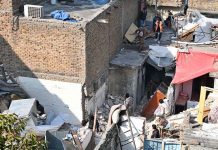By Umbreen Turk
ISLAMABAD: Women’s increased access to land through inheritance and purchase and elimination of discriminatory practices and customs that prevent rural women from acquiring land are crucial to empower rural women of Pakistan and bridge the gender gap. Experts suggested implementation of Women’s Property Act 2019 to make sure rural women are not left behind.
They were speaking at an event jointly hosted by the Food and Agriculture Organization (FAO) of United Nations, UN Women Pakistan and International Labour Organization (ILO) in connection with the International Women’s Day here on Tuesday.
Out of Pakistan’s 132 million rural population, 65 million are women. 62 percent women work in the fields while only 19 percent women are in paid employment and 60 percent work as unpaid workers on family farms and enterprises. The unpaid work is valued at 2.6 percent of the national GDP. Only one percent women are entrepreneurs in Pakistan; 20 percent of rural women are classified as own account workers ‘“ 14 percent in agriculture and 6 percent in non-agri work.
International Women’s Day is a global day celebrating the social, economic, cultural and political achievements of women. This year’s theme for International Women’s Day is ‘I am Generation Equality: Realizing Women’s Rights’ , which is aligned with UN Women’s new multigenerational campaign, Generation Equality, which marks the 25th anniversary of the Beijing Declaration and Platform for Action, the most progressive roadmap for the empowerment of women and girls, everywhere.
Two panel discussions were organized where development sector actors, NGO representatives, and rural women discussed about the existing policies and frameworks to safeguards the rights of rural working women. Country Representative FAO Mina Downlatchachi while moderating the panel said, ‘Women are not paid equally to that of their male counterparts. Despite steady progress in representation, women are still not present in equal numbers in business or politics, and globally women’s education, health and the violence against them is worse than that of men.




